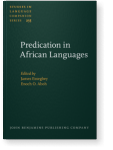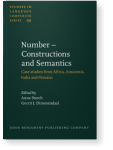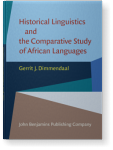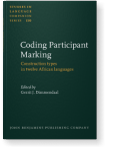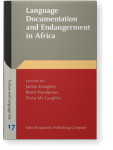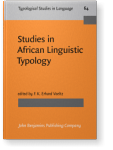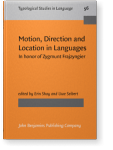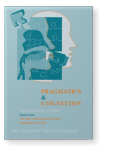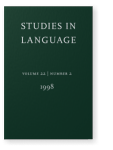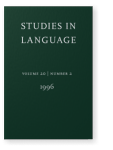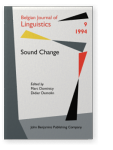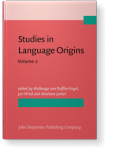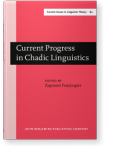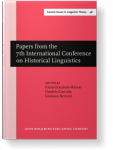Gerrit J. Dimmendaal
List of John Benjamins publications for which Gerrit J. Dimmendaal plays a role.
Book series
Titles
Number – Constructions and Semantics: Case studies from Africa, Amazonia, India and Oceania
Edited by Anne Storch and Gerrit J. Dimmendaal
[Studies in Language Companion Series, 151] 2014. xv, 366 pp.
Subjects Functional linguistics | Semantics | Syntax | Theoretical linguistics | Typology
Historical Linguistics and the Comparative Study of African Languages
Gerrit J. Dimmendaal
[Not in series, 161] 2011. xviii, 421 pp.
Subjects Afro-Asiatic languages | Contact Linguistics | Historical linguistics | Other African languages
Coding Participant Marking: Construction types in twelve African languages
Edited by Gerrit J. Dimmendaal
[Studies in Language Companion Series, 110] 2009. xvi, 389 pp.
Subjects Afro-Asiatic languages | Other African languages | Semantics | Syntax | Theoretical linguistics | Typology
2024 Chapter 2. Locative expressions and their semantic extensions in Tima Predication in African Languages, Essegbey, James and Enoch O. Aboh (eds.), pp. 44–73 | Chapter
Tima (Niger-Congo, Sudan), has three copulae playing a central role in locative expressions. The number-sensitive copulae, ŋ̀kɔ́ ‘cop:sg’ and ɲ̀cɛ́ ‘cop:pl’, primarily link two non-verbal phrases. The third copula, ŋ̀kwíyʌ̀ ‘cop’, indicates existence or availability. We discuss the distribution… read more
2015 Different cultures, different attitudes: But how different is “the African situation” really? Language Documentation and Endangerment in Africa, Essegbey, James, Brent Henderson and Fiona Mc Laughlin (eds.), pp. 37–58 | Article
The maintenance or restoration of vitality to endangered languages has become
an important part of many current language documentation projects, and the
development of orthographies and primers is often seen as a key instrument in
this endeavor. The present contribution, which focuses on endangered… read more
2014 Chapter 3. Pluractionality and the distribution of number marking across categories Number – Constructions and Semantics: Case studies from Africa, Amazonia, India and Oceania, Storch, Anne and Gerrit J. Dimmendaal (eds.), pp. 57–76 | Article
The crucial role of constructions in grammar has been argued for, in particular with respect to idioms, by Fillmore, Kay and O’Connor (1988). But constructions, varying in size and complexity, have been claimed to constitute a central property of language structure in general, in studies such as… read more
2014 Chapter 1. One size fits all? On the grammar and semantics of singularity and plurality Number – Constructions and Semantics: Case studies from Africa, Amazonia, India and Oceania, Storch, Anne and Gerrit J. Dimmendaal (eds.), pp. 1–32 | Article
2009 Introduction Coding Participant Marking: Construction types in twelve African languages, Dimmendaal, Gerrit J. (ed.), pp. 1–22 | Article
2009 Tima Coding Participant Marking: Construction types in twelve African languages, Dimmendaal, Gerrit J. (ed.), pp. 331–353 | Article
This study presents a first introduction to the phonological, morphosyntactic and pragmatic structure of Tima, a poorly-known language in Sudan whose wider genetic affiliations still need to be clarified. A number of structural properties of Tima, being of particular interest from an areal and… read more
2009 Tama Coding Participant Marking: Construction types in twelve African languages, Dimmendaal, Gerrit J. (ed.), pp. 305–329 | Article
In the Eastern Sudanic (Nilo-Saharan) language Tama event structure is expressed either by full verbs or by combinations of light verbs plus complements. Tama has a rather extensive case-marking system involving clitical elements which are attached to pronouns or to the final constituent in a noun… read more
2006 Head marking, dependent marking and constituent order in the Nilotic area Studies in African Linguistic Typology, Voeltz, F.K. Erhard (ed.), pp. 71–92 | Article
2003 Locatives as core constituents Motion, Direction and Location in Languages: In honor of Zygmunt Frajzyngier, Shay, Erin and Uwe Seibert (eds.), pp. 91–109 | Article
2002 Colourful psi’s sleep furiously: Depicting emotional states in some African languages The Body in Description of Emotion: Cross-linguistic studies, Enfield, N.J. and Anna Wierzbicka (eds.), pp. 57–83 | Article
This study sets out to investigate the “poetry of grammar”, more specifically the role of the body in figurative speech, in African languages mainly belonging to Nilotic and Bantu. Apprehending the semantics and pragmatics of metaphorical and metonymic expressions in these languages presupposes… read more
1996 Attitude Markers and Conversational Implicatures in Turkana Speech Acts Studies in Language 20:2, pp. 249–274 | Article
Turkana has a set of particles expressing attitudes on the part of the speaker towards the propositional content of utterances in which such markers are used. Attitude markers in Turkana form a closed set whose distributional behavior partly follows from syntactic principles of the language. The… read more
1994 The Role of Bilingualism in Nilotic Sound Change Sound Change, Dominicy, Marc and Didier Demolin (eds.), pp. 85–109 | Article
Abstract. The Nilotic family, a group of languages spoken in East Africa allows a uniform subgrouping on the basis of Neogrammarian principles of shared innovations. Nevertheless, there is also evidence for wave-like innovations cutting across intragenetic boundaries. For example, the original… read more
1991 Some observations on evolutionary concepts in current linguistics Studies in Language Origins: Volume 2, Raffler-Engel, Walburga von, Jan Wind and Abraham Jonker (eds.), pp. 225–244 | Article
1989 Complementizers in Hausa Current Progress in Chadic Linguistics: Proceedings of the International Symposium on Chadic Linguistics, Boulder, Colorado, 1–2 May 1987, Frajzyngier, Zygmunt (ed.), pp. 87–110 | Article
1987 Drift and selective mechanisms in morphological change: the Eastern nilotic case Papers from the 7th International Conference on Historical Linguistics, Giacalone Ramat, Anna, Onofrio Carruba and Giuliano Bernini (eds.), pp. 193–210 | Article
